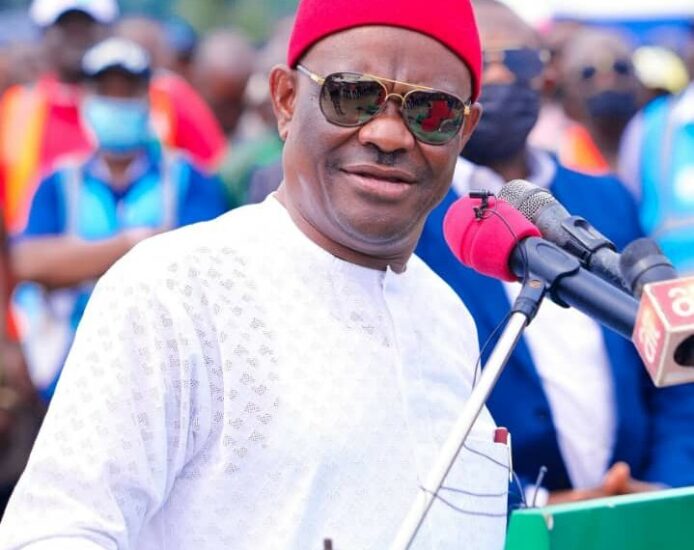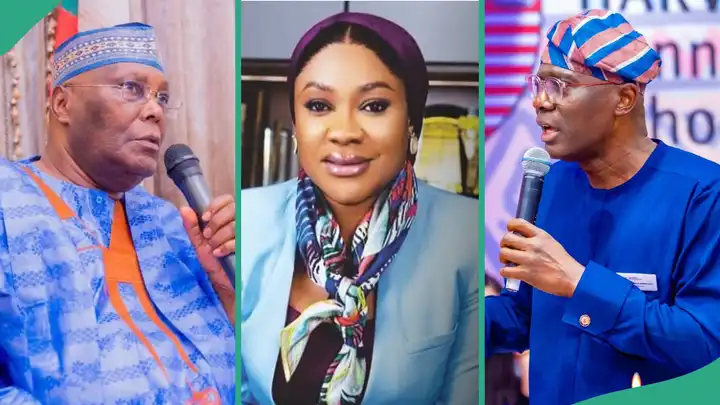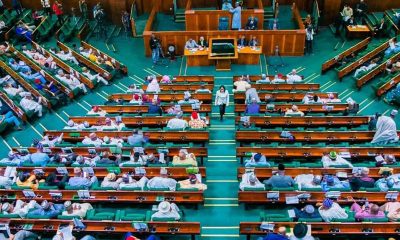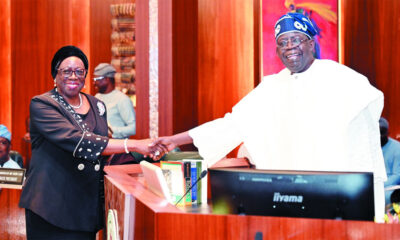News
Supreme Court Justices tackles CJN, protest lack of accommodation, vehicles

Fourteen lustices of the Supreme Court have protested the poor state of affairs in the court in a letter written to the Chief Justice of Nigeria (CJN), Tanko Muhammad.
The letter which is the first of its kind in the history of the apex court, contained the operational challenges that impair the optimal functioning of the court and efficient adjudication of cases.
A copy of the letter quoted by PREMIUM TIMES noted that the protest became necessary following the refusal of the CJN to address the issues despite drawing his attention to them.
The aggrieved justices led by the second most senior judge of the Supreme Court, Olukayode Ariwoola, listed the issues to include — vehicles, electricity tariff, supply of diesel, Internet services to (Justices’) residences and chambers, and epileptic electricity supply to the court.
Following the complaints that were raised at a March 2022 meeting “after several persistent requests to hold the meeting,” a “welfare committee” was set up to aggregate the issues.
But the justices said, “Your Lordship (the CJN) received and ignored these demands since 24th March 2022.”
According to the letter, some justices who were sworn in two years ago lack residential accommodation at the court.
“At the Justices meeting, we intimated your Lordship that some Justices sworn on the 6th day of November 2020 were yet to be accommodated by the court.
“Your Lordship promised to take up the issue that day. To date, Your Lordship has not taken any step in this direction.”
Another issue the justices raised concerns decrepit vehicles with several due for replacement, while “some of the vehicles supplied to the justices are either refurbished or substandard,” as Muhammad refused “to address this problem.”
On the issue of overseas training, the CJN was accused of gallivanting with his “spouse, children and personal staff,” while depriving the rest of the judges of the Supreme Court of such. On two occasions when the judges travelled overseas for the training, they said, they were not allowed to go with an assistant as it used to be under previous administrations.
“We demand to know what has become of our training funds. Have they been diverted, or is it a plain denial?” the justices queried.
“Your Lordship’s assumption of office Justices only attended two workshops in Dubai and Zanzibar. They were not accorded the privilege of travelling with accompanying persons as was the practice,” the letter said.
The jurists noted that despite improved budgetary allocation to the judiciary, “we find it strange that despite the upward review of our budgetary allocation, the court cannot cater for our legitimate entitlements. This is unacceptable!”
The justices decried the lack of legal research assistants, despite the magnitude of cases being adjudicated.
“We are confronted with various complex legal issues of national significance with the addition of time-bound matters coming in between our regular Court sittings. We require qualified legal assistants in order to offer our best. This demand has not been accorded any attention by the Honourable Chief Justice.”
They pointed out that “healthcare has deteriorated” with the Supreme Court’s staff clinic becoming a “mere consulting clinic,” where “drugs are not available to treat minor ailments. There is a general lack of concern for Justices who require immediate or emergency medical intervention.”
On the issue of rules of court, the justices said the CJN had withheld his assent to “Rules of Court for almost three years now,” thereby slowing justices’ productivity in dispensing with cases, adding “we strongly believe the new rules will aid speedy dispensation of justice.”
On erratic electricity supply, the justices said they have been confined to work between the “hours of 8am and 4pm daily, for lack of diesel,” after they were notified of the development by the Supreme Court’s Chief Registrar, Hajo Bello.
Lamenting the implications of Ms Bello’s memo of shutting down power supply by 4. p.m, even when justices have judgements and rulings to write outside of office hours, they said: “The implication of this memo (on power shutdown) is that the Justices must finish their work and close before 4 pm. Your Lordship with all due respect, this is the peak of the degeneration of the Court; it is the height of decadence and clear evidence of the absence of probity and moral rectitude.”
Drawing a comparison between the two other arms of government– Executive and Legislature, the justices said: “The Supreme Court is the seat of the Judiciary as an arm of government.”
Urging the CJN to take full responsibility for preserving the dignity of the apex court, the justices said: “We must not abandon our responsibility to call Your lordship to order in the face of these sad developments that threaten our survival as an institution. We have done our utmost best to send a wake-up call to Your Lordship. A stitch in time saves nine.”
They added that should Mr Muhammad fail to address their concerns, “we will be compelled to (take) further steps immediately. May this day never come.”
Those who signed the letter are Olukayode Ariwoola, Musa Dattijo Mohammed, Kudirat Motonmori O. Kekere-Ekun, and John Inyang Okoro
Others are Chima Centus Nweze, Amina Adamu Augie, Uwani Musa Abba-Aji, Mohammed Lawal, Helen Moronkeji Ogunwumiju, Abdu Aboki, Ibrahim Saulawa, Adamu Jauro, Tijjani Abubakar and Emmanuel Agim.
News
I didn’t collapse, says Wike, warns death rumour mongers

I didn’t collapse, says Wike, warns death rumour mongers
Minister of the Federal Capital Territory, Nyesom Wike, has debunked reports that he collapsed and was rushed to the hospital last week.
Wike described the reports of his rumoured collapse as the handiwork of “baseless” people trying to score cheap political points.
He spoke after inspecting four ongoing projects in the FCT, including the International Conference Centre.
Online posts circulating on X had surfaced alleging that the minister collapsed at an event on Friday in the FCT.
The rumour also claimed that Wike was immediately rushed to an undisclosed hospital, where he received treatment.
Reacting, Wike said, “There was no time I collapsed, there was no time anybody took me overseas. But you see me every day. The day Mr President broke iftar on his birthday, I was there.
“The next day, I led Abuja residents to pay Sallah homage. I see all those stories just died down. This is politics. We have thick skin. Those things don’t bother us. We are not distracted. We are focused on our jobs.
“So, I thank Nigerians for being worried, which should be, but people should not wish their fellow human beings such a thing to happen.
“We know that we will die one day. Nobody will remain in this world forever, but it is only God that says the day you will die, not any human being to say you will die today or you will die tomorrow.
“So, you have seen that I am even healthier than most of them who carried that rumour and I will write their condolence letters. I can assure you that I will write their condolence letters.”
News
World Bank approves Tinubu’s $632m loan request

World Bank approves Tinubu’s $632m loan request
The World Bank is poised to approve $632 million in new loans to Nigeria today (Monday), amid growing concerns over the country’s expanding debt profile.
The loans are intended to support important sectors such as nutrition enhancement and quality basic education.
According to data obtained from the World Bank’s website on Sunday, the two loans scheduled to be approved today are $80 million for the Accelerating Nutrition Results in Nigeria 2.0 initiative and $552 million for the HOPE for Quality Basic Education for All programme.
Both projects are now in the negotiating phase and are likely to gain final clearance later today.
These new loans are part of the World Bank’s overall strategy to support Nigeria’s development agenda, which focuses on healthcare, education, and community resilience.
The loans will support the government’s efforts to improve nutrition and education for Nigerian children.
Additionally, the World Bank approved a $500 million loan for Nigeria’s Community Action for Resilience and Economic Stimulus Programme on March 28, 2025, a significant step towards addressing the country’s economic challenges through expanded access.
The initiative, formally known as the NIGERIA: Community Action (for) Resilience and Economic Stimulus Programme, is intended to give critical support to households impacted by economic downturns while also strengthening community resilience.
The initiative focuses on vulnerable populations, providing assistance to households and small companies to help them cope with economic difficulties.
READ ALSO:
- Okada rider allegedly stabbed to death by wife over money
- Police rescue two persons abducted in Lagos
- Miyetti Allah accuses Benue community of poisoning 20 cows
The loan clearance is likely to considerably boost Nigeria’s efforts to revive the economy through grassroots backing, especially given current issues such as inflation and high living costs.
The stimulus plan will prioritise enhancing food security and developing economic possibilities for the populations most affected by recent economic changes.
This decision came after a delay in distributing funds for a previous loan aimed at poor and vulnerable Nigerians.
Further investigation by The PUNCH revealed that the World Bank disbursed around $315 million to Nigeria from the $800 million allocated for the National Social Safety-net Program Scale Up.
Nigeria is yet to receive further funding from the World Bank for this loan project, which was approved in December 2021. The delay in grant release is most likely due to fraud detected under the initiative.
In honour of the 2023 International Day for the Eradication of Poverty, President Bola Tinubu unveiled a social safety net programme that will distribute N25,000 to 15 million households over the course of three months.
The Federal Ministry of Humanitarian Affairs and Poverty Alleviation was responsible for managing the $800 million World Bank loan initiative.
However, due to allegations of embezzlement, the federal government was forced to stop the cash transfer program for further investigation and reform.
Betta Edu, a former humanitarian minister, was previously suspended for misappropriating N585 million set aside for palliative care distribution.
READ ALSO:
- Wike’s aide slams Atiku, says it’s too late to buy integrity
- Reps Committee recovers N21.4bn from four oil companies
- West African juntas impose levy on imported goods ECOWAS nations
Furthermore, Sadiya Umar-Farouq, Edu’s predecessor, was under investigation by the EFCC. The former minister is being investigated for allegedly laundering N37.1 billion during her stint as minister.
The World Bank also imposed sanctions on people and businesses discovered to be engaging in fraud under the initiatives.
According to the World Bank’s official website, this will bring Nigeria’s total approved loans to $9.25 billion over three years, indicating a growing reliance on multilateral funding to support critical sectors of the economy such as infrastructure, healthcare, education, and financial resilience.
A review of Nigeria’s World Bank loan approvals since 2023, under President Bola Tinubu’s government, reveals a huge rise in funding commitments.
In 2023, the World Bank approved $2.7 billion in loans for renewable energy, women’s empowerment, education, and the power sector. In 2024, funding approvals totalled $4.32 billion for various projects.
This increase was largely due to Nigeria’s growing need for financial assistance to stabilise the economy amid fiscal pressures and rising public debt.
Under President Bola Tinubu’s administration, the World Bank granted around 11 different credit projects for Nigeria.
In less than two years, the federal government has acquired loans from the World Bank totalling $7.45 billion, raising concerns about the mounting debt burden. According to data from the Debt Management Office, the World Bank’s portion of Nigeria’s external debt is $17.32 billion as of the third quarter of 2024.
The International Development Association is owing the majority of this debt, which amounts to $16.84 billion, or 39.14 per cent of Nigeria’s total external debt.
The International Bank for Reconstruction and Development, another World Bank subsidiary, is owing $485.08 million, or 1.13 per cent.
While the planned World Bank loans may give much-needed budgetary relief, concerns persist about the country’s mounting debt burden.
According to recent data from the Central Bank of Nigeria, the country has spent $5.47 billion servicing external debt in the last 14 months, underscoring the strain on its foreign reserves.
World Bank approves Tinubu’s $632m loan request
News
Investigation of wanted businesswoman Achimugu not linked with Atiku, Sanwo-Olu – EFCC

Investigation of wanted businesswoman Achimugu not linked with Atiku, Sanwo-Olu – EFCC
The Economic and Financial Crimes Commission has reacted to media reports linking its investigations of Ms. Aisha Achimugu with political undercurrents involving former Vice President Atiku Abubakar and Lagos State Governor, Babajide Sanwo-Olu
This is contained in a statement by the commission on Friday night.
The statement read, “We wish to state unequivocally that the investigations of Achimugu have no correlation of any kind with the two political actors. She is being investigated for alleged criminal conspiracy and money laundering and has since been declared Wanted by the Commission”.
The EFCC started investigating Achimugu in 2022. Although she approached the court to obtain an injunction restraining the Commission from arresting, investigating, inviting or detaining her for any alleged criminal act, the injunction was challenged and vacated on Wednesday, February 19, 2025 by a Federal High Court sitting in Abuja.
The court ruled that “…no court has the power to stop the investigative powers of the Police or EFCC or any agency established under our laws to investigate crimes when there is reasonable suspicion of commission of a crime or ample evidence of commission of an offence by a suspect.”
“The court further upheld the interim order of forfeiture of assets of Achimugu suspected to be proceeds of crime, dismissing her suit against it as lacking merit .
“The foregoing clearly establishes that the EFCC’s case against her has no immediate or remote nexus with any politician or any veiled or open reference to any political engagement or transaction.
“The EFCC is non-partisan and non-sectarian. We enjoin the public to continue to keep faith with the professionalism of the Commission without imputing any extraneous consideration to its works.”
-

 metro2 days ago
metro2 days agoMan jailed 3 months for non-declaration of $30,000 at airport
-

 International2 days ago
International2 days agoTrump slams Nigeria with high tariff in shocking trade crackdown
-

 metro2 days ago
metro2 days agoUpdated: Notorious bandit leader Bello Turji goes berserk, kills 12 for Eid
-

 metro23 hours ago
metro23 hours agoPetitioners mobilise constituents for fresh Natasha’s recall
-

 metro3 days ago
metro3 days agoEdo Gov Okpebholo wins round one as tribunal upholds his election
-

 metro2 days ago
metro2 days agoSouth African court acquits Nigerian pastor of rape after 8 years in jail
-

 metro23 hours ago
metro23 hours agoFraud rocks FIRS, court orders final forfeiture of Abuja, Kano houses linked to official
-

 metro3 days ago
metro3 days agoPolice hunt for last suspect in LASU graduate killing









